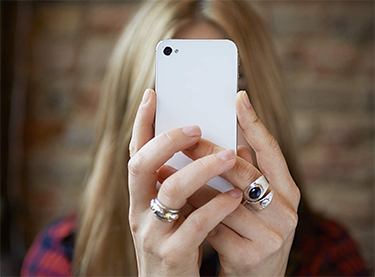 Our digitally-connected lifestyle is taking a heavy toll on our health. According to an article in Magazine Media, our collective phone addiction is changing how our brains work and creating harmful stress hormones. (Note: the original article linked above is in Dutch. Open in Chrome to translate into English.)
Our digitally-connected lifestyle is taking a heavy toll on our health. According to an article in Magazine Media, our collective phone addiction is changing how our brains work and creating harmful stress hormones. (Note: the original article linked above is in Dutch. Open in Chrome to translate into English.)
“The average adult person stares at his or her smartphone for an average of 4 hours a day,” the article notes. “That is 240 minutes or a quarter of your day (if you sleep 8 hours a night, which has also become rather rare due to the use of mobile phones). As we reported earlier, this addiction changes how your brain works and can be disastrous for your cognitive skills.”
Beyond these well-documented side effects of our pocket pals, there’s an organic change happening in our bodies, as smartphone usage has been shown to increase the stress hormone cortisol in our bloodstream.
“Cortisol is the hormone that controls our fight or flight response so that we can survive in dangerous situations. This also results in increased blood pressure, heart rate and blood sugar, all not good for the body,” the article notes. “Especially when this happens every time in response to your mobile, every time you get angry, frustrated, enthusiastic or happy about the thing.”
This kind of chronic, insidious stress puts your health at risk, according to the Mayo Clinic, and can cause:
- Anxiety
- Depression
- Digestive problems
- Headaches
- Heart disease
- Sleep problems
- Weight gain
- Memory and concentration impairment
- Type 2 diabetes
I find it fascinating that the thing we say we can’t live without is putting our health at risk every time we use it. And it’s happening not just when we are using the phone, but when it’s simply resting nearby and those notifications come dinging in.
It’s no wonder there is such a call for digital minimalism; it dovetails perfectly with the growing awareness of self-care and our personal responsibility to look after our own well-being.
Some might say I’m being an alarmist. No, I promise you, I’m just a realist. I recognize these signs in my own phone use, which is why I don’t use social media on my phone and I keep it in another room when I’m trying to focus at work or relax at home.
Share the article with the people you care about; we can all do better in how we use our phones, and what we expect from the people on the other end. We don’t have to answer every text within minutes. And we certainly don’t have to engage on social media to prove the strength of our relationships.
It’s time to negotiate a healthier, more productive relationship with the technology that stands poised to overtake us.

June 27, 2019, 10:44 am